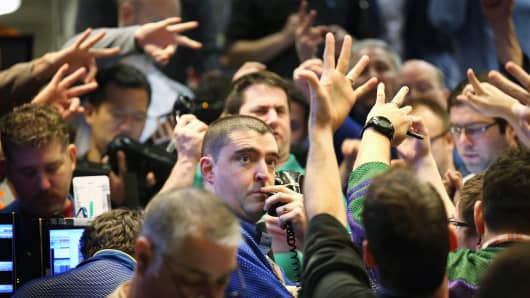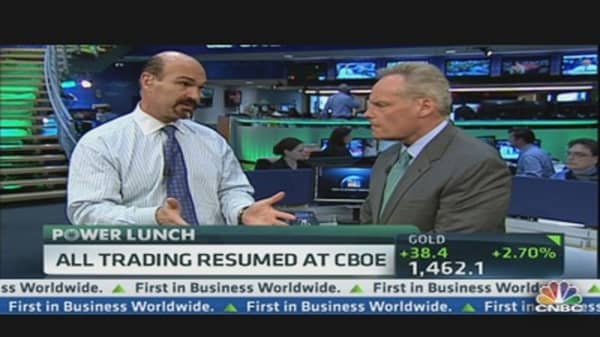Stutland said most of the trading functions were operating normally once they reopened, but some electronic methodology of confirming open outcry trades were being entered manually. Also, one relatively small system of order routing still had problems. That is the automated auction process used by a broker who has customers on both sides of a trade.
The CBOE later said in a note to customers that it regretted the outage, and that it has isolated the software issue that caused the problem and made adjustments for a normal opening Friday.
"We are also conducting an ongoing and thorough internal review of the software problem to prevent something like this from happening again," the CBOE said.
The outage was the latest in a series of disruptions at exchanges, including Nasdaq's high-profile flub with the Facebook IPO last year. It also comes at a time when the financial services industry has good reason for concern about network security due to hacks. Major banks have suffered numerous denial of service attacks on their websites in recent months, and Charles Schwab was attacked just this week. The CBOE stressed that it had not been hacked.
(Read More: UPDATE 2-Schwab website back to normal after second cyber attack )
The S&P 500 options and options on the CBOE Voltatility index, or VIX, exclusively trade on the CBOE so there was no trading in those contracts while the CBOE was shut. Other options that are multiple listed could be traded elsewhere.
Investors who wanted to trade the VIX or S&P options looked for other ways to hedge with highly correlated products, such as options on the SPY ETF or the S&P 500 futures, which trade across the street at the CME Group. They also could have used the options on the ETFs that represent the VIX.
CBOE President Edward Tilly, reached at an industry convention in Las Vegas on Thursday morning, said he was heading back to Chicago right away. All the senior exchange officials and officials from other options exchanges were in Las Vegas for the Options Industry Conference, which runs through Friday.
The heaviest volume comes at the open and at the close. As of mid-afternoon, about 150,000 S&P 500 contracts traded, about half the amount at the same time Wednesday. Volume for VIX options totaled 337,588 contracts Thursday, compared to average daily volume of 650,000.
The CBOE announced the outage just before the open, as traders were already lining up in the multilevel circular open outcry pit, as they are every morning. "We were all standing there ready to trade. There was some anger in the room," said one.
"There's going to be a lot of backlash. The CBOE is going to have a lot of explaining to do. They have a major technology problem, and they are keeping it pretty tight-lipped. It had the entire exchange shut off the marketplace. For the individual trading companies, it's definitely a lost opportunity," he said.
Stutland said he heard from traders that the problem seemed to affect the spread book. The spread book is important "when you trade one option against another contract of the same instrument, but at a different strike price. Normally that is filled together as one whole order in one chunk and it seems that's where the problem was coming from."
Traders reported that there was also notice from the CBOE of a short system outage in the early hours of Wednesday. The outage was corrected within four minutes, at 7 a.m. CT, according to a notice. It was unclear if that was related to Thursday's problem. The CBOE sent this message to traders on Wednesday: "CFE:System Issues is resolved CFE will make the 7:00 AM CST opening."
Some other major trading disruptions include:
March 2012: BATS Global Markets withdraws IPO after a series of trading glitches.
May 2012: Nasdaq software glitch in Facebook trading leads to broker losses.
August 2012: Knight Capital loses $440M after computer glitch nearly topples the firm.
November 2012: Volumes tumble on NYSE following trading glitch affecting more than 200 securities.





